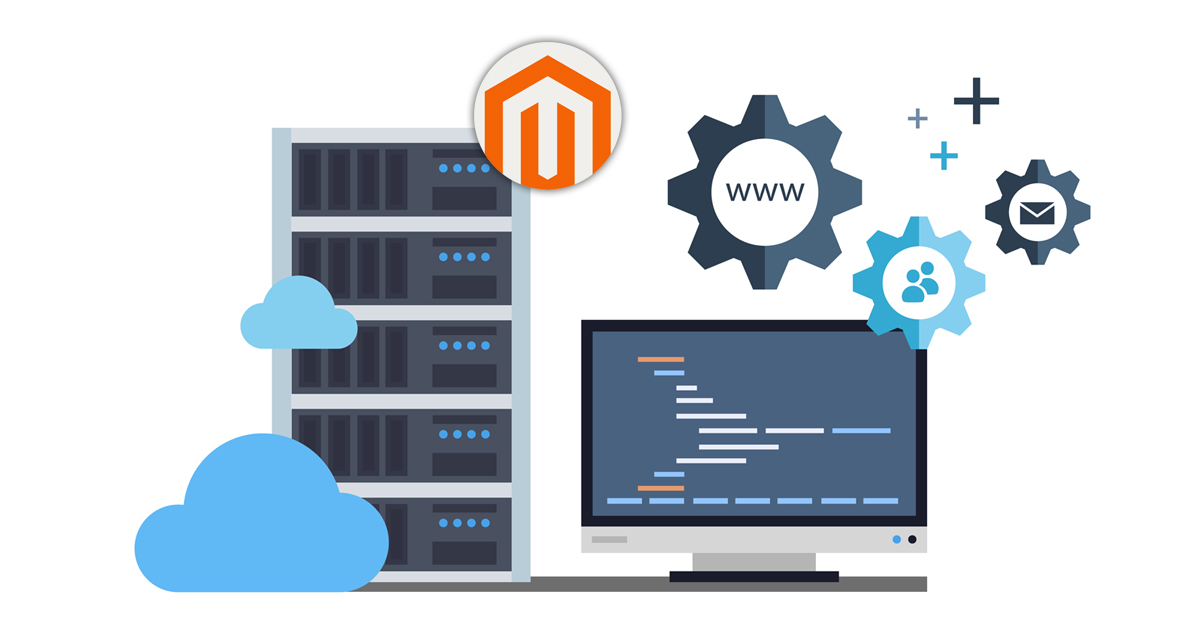eCommerce has revolutionized the business landscape, transforming how we shop and conduct transactions in the digital era. Today, the convenience of conducting business transactions is literally at our fingertips, achievable with just a few clicks on a computer or taps on a smartphone.
Among the myriad of platforms powering the eCommerce revolution, Magento stands out as a leading force. Magento’s popularity among global giants like Nike and Ford isn’t coincidental. This platform has emerged as one of the most robust, adaptable, user-centric, and scalable options in the eCommerce sector.
However, like any robust platform, Magento is not without its drawbacks. In this article, we will explore the Magento pros and cons, providing you with a balanced perspective to determine if it’s the right fit for your eCommerce needs.
Table of Contents
Brief Overview of Magento
Launched in 2008 by Varien, Inc., Magento rapidly rose to prominence as a leading eCommerce platform. In a significant development in May 2018, Adobe acquired Magento for $1.68 billion, marking a new chapter in its evolution.
Magento is celebrated for its flexible, comprehensive eCommerce solutions. It empowers merchants with the ability to customize their site’s functions extensively. Utilizing its open-source nature, businesses can craft exceptional consumer experiences, tailoring their online presence to meet specific customer needs and preferences.
Before we go deeper into the advantages of this powerful platform, let’s discover what it is.
What Is Magento?
Magento is a versatile open-source eCommerce platform that equips online merchants with a customizable shopping cart system. It also grants comprehensive control over the appearance, content, and functionality of their online store. The platform is renowned for its robust capabilities in marketing, search engine optimization, and catalog management, making it a comprehensive tool for eCommerce businesses.

Developed using PHP and the Zend Framework, Magento is known for its ability to scale to the needs of large businesses while also being suitable for smaller retailers. It allows for extensive customization and integration with a variety of third-party services and applications.
This platform is widely recognized for its robust feature set, strong SEO capabilities, and large, active community of developers and users. As a result, Magento is a popular choice for businesses looking to build comprehensive and scalable online stores.
The platform is divided into two primary offerings. The first is Magento Open Source, which continues to operate as an open-source eCommerce platform, much like it has since 2007. This version of Magento allows for extensive customization and scalability, thanks to plugins developed by a vibrant community of developers, enhancing its functionality and adaptability.
The second offering, introduced in 2016, is Magento Commerce, originally launched as a platform as a service. This platform saw significant evolution, especially after Adobe’s acquisition of Magento, and was rebranded as Adobe Commerce in 2021. This transition marks a new era for the platform, integrating it more closely with Adobe’s suite of digital tools and services, thereby enhancing its capabilities and reach in the eCommerce domain.
Magento Open Source and Magento Commerce
Magento, since its launch, has been available in two distinct editions, each catering to different business needs and scales.
Magento Open Source (formerly Magento Community Edition)
Magento Open Source is the accessible face of the Magento platform. Its core code can be freely downloaded and customized to meet specific business requirements. This edition provides basic eCommerce functionalities, which can be significantly enhanced through custom modules or by integrating ready-made extensions from the Magento Marketplace. This flexibility makes Magento Open Source an appealing choice for businesses looking for a cost-effective, adaptable eCommerce solution that they can tailor to their unique needs.
Magento Commerce (formerly Magento Enterprise Edition)
Magento Commerce is the more advanced edition of the two, designed to cater to mid-market companies and large enterprises. This edition is available in two forms: a self-hosted version and a cloud-hosted edition, also known as Magento Commerce Cloud. The feature set of Magento Commerce is considerably more extensive than that of Magento Open Source, offering advanced functionalities and tools that are essential for larger businesses with more complex eCommerce needs.
Advantages of Magento
Magento, as a leading eCommerce platform, offers a range of advantages that make it a popular choice for businesses of all sizes. Here are some of the key benefits.
Flexibility and Customization
Magento’s high flexibility and customization capabilities are key advantages for businesses looking to tailor their eCommerce experience. Being open-source, Magento allows for extensive modifications to its code, enabling the creation of custom templates and on-brand storefronts that resonate with your target audience.

One of Magento’s strengths lies in its ability to handle complex online store requirements, such as:
- Operating in multiple regions with distinct languages and currencies.
- Adhering to varying laws and compliance standards across countries.
- Integrating with Enterprise Resource Planning (ERP) systems.
- Utilizing IoT devices for sales.
- Managing extensive catalogs of custom products.
- Offering localized content for different regions.
Magento’s vast array of features empowers businesses to fine-tune their storefronts to meet diverse customer needs. If a specific function is not available natively, Magento’s extensive library of third-party extensions steps in, offering thousands of features ranging from catalogs and promotions to SEO optimization.
Furthermore, Magento’s API-led architecture simplifies the integration of third-party systems like ERP and CRM, as well as various payment methods, without compromising website performance.
The platform also supports a headless approach, allowing businesses to separate the front-end user interface from back-end commerce operations. This level of customization ensures that with Magento, the possibilities for tailoring your eCommerce site are virtually limitless.
Multiple Features and Functionality
Magento distinguishes itself with an extensive array of built-in features, catering to the core needs of a standard eCommerce website.
The platform’s general features encompass a wide range of functionalities, including marketing, promotions, site management, catalog management, checkout and payment processes, order management, customer accounts, and services, as well as analytics and reporting. These standard features form the backbone of all Magento-based eCommerce solutions.

Additionally, Magento offers standout features that contribute to business growth, such as:
- Page builder for easy site customization
- Content staging for better content management
- Customer segmentation for targeted marketing
- Dynamic rule-based product relations for personalized experiences
- Instant purchase options to enhance conversion rates
- Visual merchandising for an appealing storefront
- Advanced business intelligence for data-driven decision-making
Magento’s feature set is designed to increase conversions, improve agility, and boost performance. It also facilitates B2B integrations, allowing for efficient management of company accounts and credit systems.
The platform’s adaptability extends to responsive theme designs, which can be customized for different devices. For handling large-scale search queries, Magento integrates seamlessly with Elasticsearch. The Magento Admin dashboard is intuitive, offering easy access to vital sales, order, and product data.
With the release of Magento 2.4, the platform has further enhanced its B2B functionalities, PWA studio for international store support, and performance capabilities for managing large catalogs, solidifying Magento’s position as a comprehensive and versatile eCommerce solution.
Scalability
Magento’s scalability is one of its most significant advantages, making it an ideal choice for online retailers concerned about website performance. With Magento, the fear of a slow or underperforming website is mitigated, regardless of the size of your inventory. Whether you’re managing a hundred items or scaling up to a million SKUs, Magento handles it with ease, requiring minimal performance tuning.

A key benefit of Magento is its capacity to support over 500,000 products on a single server, provided it has a decent amount of RAM (32-64GB). Moreover, it can process thousands of transactions per hour.
This capacity for handling a vast number of SKUs is further enhanced when you move your store to cloud servers, facilitating smooth scaling and the ability to manage peak loads efficiently. This scalability makes Magento 2 particularly advantageous compared to other eCommerce platforms.
Magento’s global reach allows you to expand your store to various countries, tapping into new customer bases. The platform adeptly manages complex business scenarios, accommodating multiple brands and facilitating both B2B and B2C hybrid commerce models.
Additionally, its native integrations streamline workflows, simplifying the management of a growing and diverse online business.
SEO Capabilities
SEO capabilities are a critical component in the success of an eCommerce business, and Magento excels in this area. In a constantly evolving eCommerce landscape, the ability to ensure your site is highly visible and easily discoverable can make a significant difference between success and failure.
One of the advantages of Magento being an open-source platform is the level of control it offers over various aspects of your site. Unlike platforms like Wix, where control over technical details is more restricted, Magento provides extensive freedom.

This flexibility is particularly beneficial for technical SEO, a crucial aspect that can significantly influence a site’s search engine friendliness.
Magento allows for unique customization in areas that directly impact SEO. Users have control over creating unique category paths for URLs and managing URL redirects effectively. These features play a pivotal role in enhancing the search-friendliness of your site.
Furthermore, Magento comes with built-in essential SEO functions, and its compatibility with various third-party integrations enables handling more complex SEO tasks.
The detailed level of control Magento offers, compared to other platforms, provides a valuable advantage in crafting creative and effective organic search campaigns.
Mobile Responsiveness and Omnichannel Support
Magento’s customization capabilities play a significant role in enhancing omnichannel and mobile experiences, which are crucial in today’s eCommerce landscape.
In an era where consumers increasingly adopt a mobile-first approach, smartphones have become integral to every phase of the purchasing journey, from brand discovery to price comparison. With mobile commerce projected to reach $3.5 trillion, failing to provide a mobile-friendly website can be detrimental to your online presence. A mobile-responsive site is no longer optional; it’s a necessity to stay competitive and reach customers effectively.

Moreover, offering a seamless omnichannel experience is vital for the success of any eCommerce site or marketplace. Customers expect consistent and cohesive interactions across all channels, whether they are shopping online from a desktop or mobile device, or in a brick-and-mortar store.
Magento excels in this area by offering robust omnichannel support, enabling businesses to tailor different channels to meet diverse customer needs effectively. By utilizing customer data from these various channels, Magento helps businesses make more informed decisions, enhancing the overall customer experience and driving business growth.
Community Support
Magento’s widespread popularity offers significant advantages to merchants, primarily through its large community support. This extensive support network is a major asset for businesses using Magento.

Firstly, finding a vendor to support your Magento store is straightforward, thanks to the comprehensive Magento Partners portal. This ease of access to support ensures that merchants can efficiently maintain and enhance their eCommerce platforms. Additionally, many third-party providers tailor their systems to be compatible with Magento, further easing integration and functionality.
Secondly, Magento boasts a vast community of contributors who are readily available to provide immediate solutions to any Magento-related challenges. This community, often referred to as Magento’s army of innovators, includes more than 360,000 forum members, 8,000 certified developers, 5,900 contributors, and 1,150 partners. This extensive network not only facilitates problem-solving but also fosters a collaborative environment for continuous improvement and innovation.
Moreover, Magento, as a platform provider, actively engages in the success of its merchants. The company organizes various events such as meetups, conferences, and contribution days, fostering a sense of community and providing opportunities for learning, networking, and collaboration among its users. This level of community and corporate support is a distinct advantage for Magento users, contributing to the platform’s overall effectiveness and appeal in the eCommerce space.
GDPR and Compliance Laws
Magento offers significant advantages when it comes to navigating the complexities of GDPR and other compliance laws.
The General Data Protection Regulation (GDPR) is a pivotal EU law focusing on data protection and privacy. Magento assists merchants in adhering to GDPR requirements through the implementation of a standard data processing agreement (DPA). This DPA is specifically designed to align with the stipulations of the GDPR.
To aid in maintaining compliance, Magento provides a range of resources and documents. Merchants can also utilize the Magento GDPR extension to further streamline their compliance processes.
Beyond GDPR, Magento Commerce (now known as Adobe Commerce) holds a PCI certification as a Level 1 solution provider, ensuring the secure handling of customers’ payment card information. This certification underscores Magento’s commitment to security and compliance.
Magento’s array of compliance features includes secure payment gateways, efficient management of taxes and accounts, comprehensive compliance assistance, and SOC 2 compliance.
Moreover, Magento’s systems are rigorously tested by third-party auditors, adding an extra layer of assurance to its commitment to maintaining high standards of compliance and security.
Cons of Magento eCommerce Platform
While Magento is a powerful eCommerce platform, it has certain drawbacks that businesses should consider.
High Development Cost
One of the most notable drawbacks of Magento is its high development cost, making it a more expensive option compared to SaaS platforms like Shopify or BigCommerce. While Magento Open Source can be accessed for free, significant expenses arise in custom development, support, maintenance, and the addition of integrations and extensions, unless you possess the necessary coding skills.
For Magento Commerce and Commerce Cloud users, the costs escalate further. Along with the development services, you must account for Magento’s licensing fees, which are based on the store’s gross revenue. The pricing for these services begins at approximately $22,000 per year for Magento Commerce and $40,000 per year for Magento Commerce Cloud.
Average Gross Sales Revenue | Magento Commerce Cost | Magento Commerce Cloud Cost |
< $1,000,000 | $22,000/year | $40.000/year |
$1,000,000 - $5,000,000 | $32,000/year | $55,000/year |
$5,000,000 - $10,000,000 | $49,000/year | $80,000/year |
$10,000,000 - $25,000,000 | $75,000/year | $120,000/year |
$25,000,000+ | $125,000/year | $190,000/year |
Therefore, Magento may not be the most suitable choice for start-ups or businesses just exploring the eCommerce platform landscape, especially if they are looking for a low-cost solution to begin their online venture. The platform’s cost-effectiveness improves as the business scales, but initial expenses can be a significant barrier for smaller or newer enterprises.
High Technical Expertise Required
Magento’s requirement for technical expertise for customization is a notable con, especially when compared to other eCommerce platforms. Unlike more user-friendly platforms like Shopify and Squarespace, which cater to coding novices, Magento presents a higher technical barrier to entry.
- Feature Customization: Magento offers extensive customization options to cater to specific business needs. However, implementing these customizations often requires a deep understanding of the platform’s complex architecture. Businesses need skilled developers who are proficient in Magento’s structure and coding standards to effectively tailor the platform to their needs. This can be a challenge for companies without access to such expertise, potentially leading to increased costs and longer development times.
- Administration Team: The administration of a Magento site is not straightforward for those without a technical background. The platform’s comprehensive and feature-rich admin interface demands a level of technical proficiency. Administrative teams need to be well-versed in navigating and managing the intricate backend operations, which can include product management, customer data handling, and order processing. This steep learning curve can be a hindrance for businesses that do not have technically skilled staff in their administration team.
- Maintenance: Regular maintenance of a Magento site, which includes updates, security patches, and troubleshooting, requires a high level of technical knowledge. Unlike some other eCommerce platforms that are more user-friendly and require minimal technical intervention for maintenance, Magento demands ongoing attention from skilled professionals. This can lead to additional expenses for businesses, either in terms of hiring specialized staff or outsourcing these tasks to external service providers.
Lengthy Project Timelines
Magento’s platform, known for its slow loading times, presents challenges in terms of customization and efficiency compared to other eCommerce platforms. This sluggish performance, particularly evident when making customizations or migrating data from other platforms, can lead to extended project timelines.

A key factor contributing to Magento’s slower loading is its flexible yet complex architecture. Setting up a Magento site, especially tailoring it to specific needs, can be a time-intensive process.
It’s important to note, however, that this issue is primarily associated with the community version of Magento. The enterprise and premium enterprise versions of Magento are known to perform much faster.
Given these aspects, choosing a Magento development company that can deliver quality results promptly becomes crucial for many merchants. This decision can significantly impact the overall efficiency and success of a Magento-based eCommerce project.
Requirement for Robust Hosting Solutions
Operating a Magento store demands robust hosting solutions, ruling out shared hosting as a viable option. Shared hosting can lead to downtimes and performance issues, particularly as website traffic increases.

Magento is a substantial platform with specific hosting needs that it outlines for merchants. It requires hosting on more advanced setups like Virtual Private Servers (VPS), cloud services, or dedicated servers.
Additionally, merchants are responsible for managing domain registration, SSL security certificates, and choosing appropriate hosting plans. This necessity for advanced hosting solutions can be particularly challenging for new merchants lacking technical expertise or a dedicated eCommerce team.
Making the Decision: Is Magento Right for You?
Considering the pros and cons of Magento 2, it’s evident that while Magento offers a feature-rich and flexible platform, it demands considerable technical expertise. It may not be the ideal choice for a startup seeking a simple and quick website builder.
Is Magento Suitable for Your Company Now?
When assessing whether Magento is the right choice for your company at this stage, several key factors need to be considered. Magento, known for its robust features and flexibility, is particularly suited for businesses that require a high level of customization and scalability in their eCommerce operations.
It’s ideal for companies that have the technical resources or the capacity to invest in skilled development teams, as Magento’s complexity requires technical know-how for optimal setup and customization.
For startups or smaller businesses looking for a straightforward, quick-to-deploy eCommerce solution, Magento might present challenges due to its steep learning curve and resource-intensive nature.
However, for mid-market to large enterprises with more complex eCommerce needs and the ability to manage the technical aspects, Magento offers a powerful platform that can support extensive product catalogs, handle high volumes of traffic, and provide a customizable customer experience.
When Should a Business Go for Magento?
A business should consider choosing Magento as its eCommerce platform under the following circumstances:
- Need for Customization and Scalability: If the business requires a high degree of customization to create a unique online store and expects to scale significantly in the future, Magento’s flexibility and scalability make it an ideal choice.
- Large Product Inventory: Businesses with a large number of SKUs (Stock Keeping Units) or a complex product catalog will benefit from Magento’s robust catalog management system.
- Technical Resources: If the business has access to technical expertise, either in-house or through partners, to handle the complexities and nuances of Magento’s platform.
- Desire for Advanced Features: For businesses seeking advanced eCommerce features like customizable checkout processes, detailed analytics, and comprehensive customer engagement tools.
- Global Expansion Goals: Companies planning to expand globally can leverage Magento’s multi-language and multi-currency support, along with its ability to handle different tax rates and compliance with various international regulations.
- Capability to handle high Traffic Volumes: Magento is well-suited for businesses anticipating or experiencing high levels of website traffic, as it can handle large volumes without compromising performance.
- Capability to handle large volumes of SKUs: The platform is designed to handle extensive product inventories, making it an ideal choice for businesses with a vast and diverse range of products.
- Integration Needs: If a business requires integration with various third-party applications, ERP systems, or CRM software, Magento’s flexible and API-driven architecture makes it a suitable choice.
- eCommerce as a Primary Business Channel: Businesses for whom eCommerce is a significant part of their sales and growth strategy, as opposed to just an additional sales channel.
In Conclusion,
Reflecting on the Magento pros and cons, it’s clear that it offers a rich array of features, boasting flexibility, scalability, and excellent mobile and SEO capabilities. The platform benefits from a robust community of developers and contributors, ready to support the technical needs of retailers. Its multi-layered architecture and open-source status empower merchants to create highly customized websites from the ground up.
However, the primary drawback of Magento can be summed up in terms of technical challenges. For those who lack coding skills, navigating Magento might lead to increased costs, a steep learning curve, and extended project durations. Nevertheless, these challenges can be effectively managed with the assistance of a skilled Magento development agency, which can help unlock the platform’s full potential for your business needs. Thus, don’t hesitate to contact our specialists to receive the best support and consultancy!











